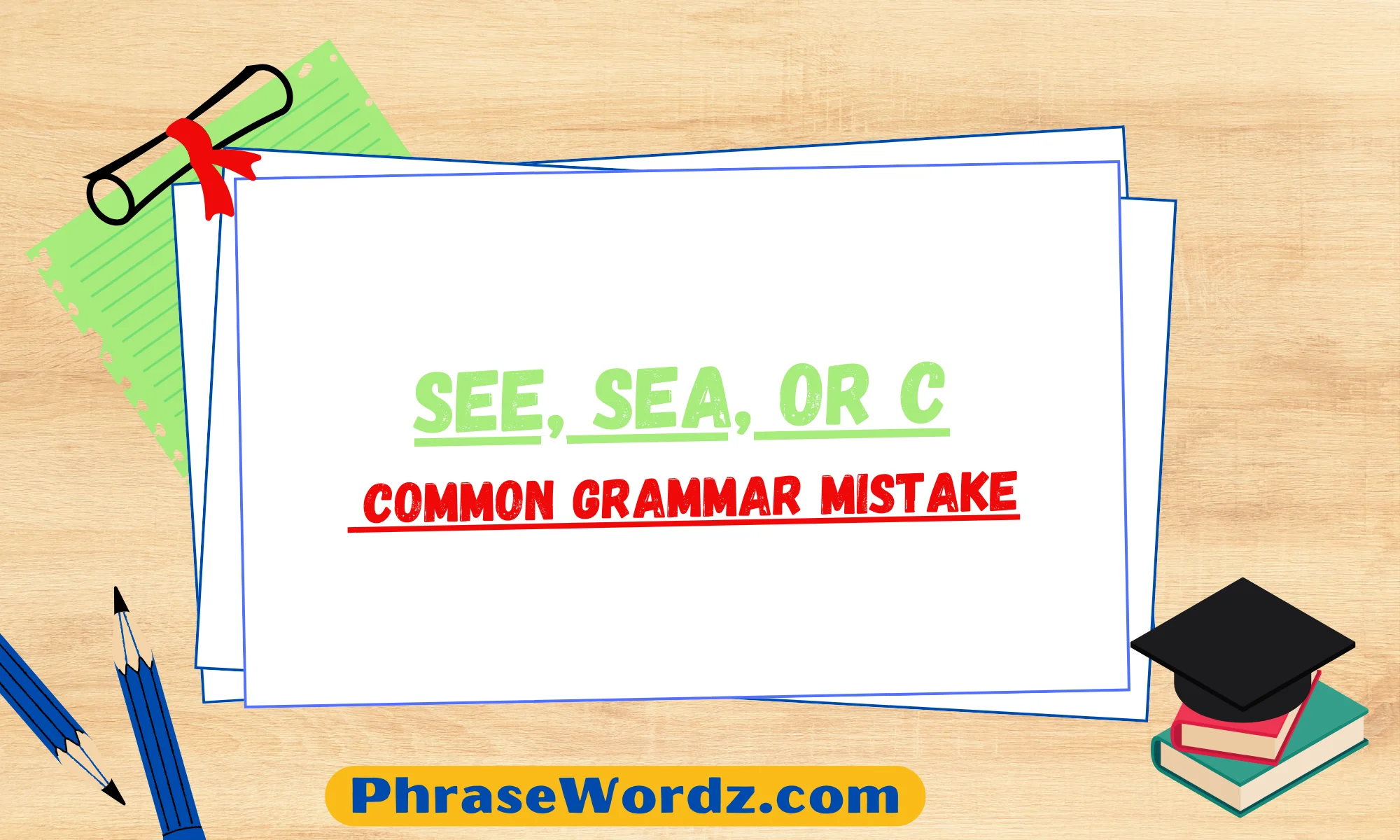English, known for its complexity and subtle nuances, often challenges learners and native speakers alike. Homophones—words that sound identical but differ in meaning and spelling—are a frequent source of confusion.
Among these, “see,” “sea,” and “C” often puzzle writers and speakers. This article will dissect their meanings, usage, and common errors, and provide practical examples and scenarios to ensure clarity.
Understanding the Meanings of “See,” “Sea,” and “C”
1. See
The verb “see” refers to the act of perceiving something with the eyes or understanding something intellectually. It is used in both literal and figurative contexts.
- Literal Example: “I can see the sunset from my balcony.”
- Figurative Example: “Do you see what I mean?”
2. Sea
The noun “sea” denotes a large body of saltwater, smaller than an ocean, or a metaphorical expanse.
- Literal Example: “The sea was calm this morning.”
- Figurative Example: “She felt lost in a sea of confusion.”
3. C
The letter “C” is the third letter of the English alphabet and is used in various contexts. It can also refer to grades, shapes, or abbreviations.
- Alphabetical Example: “The word ‘cat’ starts with a C.”
- Grade Example: “She got a C on her math exam.”
- Shape Example: “The curve forms a perfect C.”
Common Mistakes with “See,” “Sea,” and “C”
Mistake 1: Using “sea” instead of “see”
- Incorrect: “I sea the stars clearly tonight.”
- Correct: “I see the stars clearly tonight.”
Mistake 2: Confusing “see” and “sea” in figurative language
- Incorrect: “He felt lost in a see of thoughts.”
- Correct: “He felt lost in a sea of thoughts.”
Mistake 3: Misinterpreting “C” in context
- Incorrect: “The shape of the moon tonight looks like a see.”
- Correct: “The shape of the moon tonight looks like a C.”
Scenario Examples for Better Understanding
Scenario 1: Email Clarifying Usage
Subject: Clarification on Usage: See, Sea, or C
Dear Emily,
I hope this email finds you well. I noticed a recurring error in your report where “see” was confused with “sea.” For example, you wrote, “We can sea the results clearly.” The correct phrase should be, “We can see the results clearly.”
Similarly, when referring to the letter “C,” ensure it is capitalized and not mistaken for “see” or “sea.”
Let me know if you’d like further clarification!
Best regards,
Jonathan
Scenario 2: Educational Example in a Story
Narrative Context:
During a class presentation, Jane hesitated before saying, “The shape of the new logo is like a see.” Her teacher corrected her gently, “Jane, the correct word is ‘C,’ as in the letter of the alphabet. ‘See’ is what you do with your eyes, and ‘sea’ refers to the water body.”
Scenario 3: Conversation in a Workplace
Context: Explaining a Presentation
Darcy: “Elizabeth, can you sea the slide clearly?”
Elizabeth: “Do you mean if I can see the slide clearly? Or are you asking if the slide resembles a sea?”
Darcy: “Oh, I meant see! Thanks for catching that.”
Tips to Avoid Confusion
- Understand Context: Always determine whether you are referring to a visual act, a body of water, or the letter/shape/grade.
- Pronunciation Practice: While they sound the same, using them in sentences aloud can help differentiate meanings.
- Mnemonic Devices:
- Think of “sea” and “water” both containing “a.”
- “See” has two “e’s,” just like your two eyes.
Describe the Difference Between “See,” “Sea,” and “C”
| Word | Part of Speech | Meaning | Example |
|---|---|---|---|
| See | Verb | To perceive with eyes or understand | “I can see the sunset.” |
| Sea | Noun | A large body of saltwater | “We sailed across the sea.” |
| C | Noun | Third letter of the alphabet, or a grade | “The shape resembled a C.” |
Conclusion
The mix-up between “see,” “sea,” and “C” highlights the challenges of English homophones. By focusing on their definitions, practicing their usage, and understanding their contexts, you can confidently use them in writing and speech.
Take your time exploring these examples and practicing; the clarity will “see” you through!











